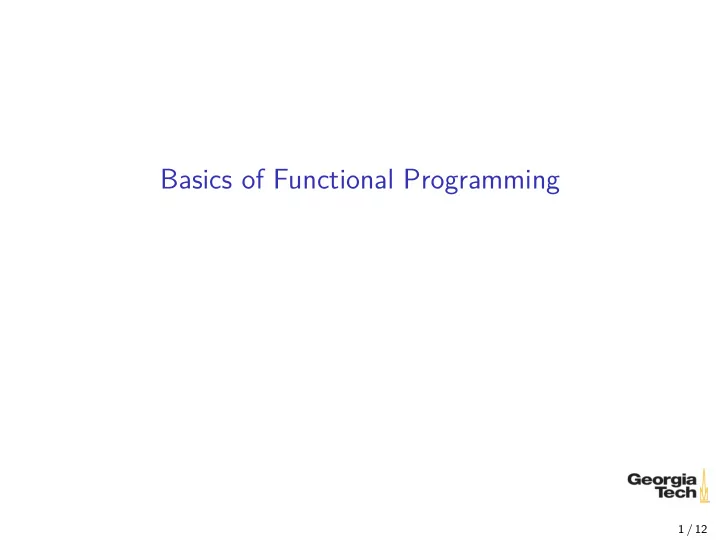

Basics of Functional Programming 1 / 12
A Motivating Example: Cafe 1 class Cafe { 2 def buyCoffee(cc: CreditCard): Coffee = { 3 val cup = new Coffee() 4 cc.charge(cup.price) 5 cup 6 } 7 } Bad because card is charged as a side effect. 2 / 12
Mockable Payments 1 class BetterCafe { 2 def buyCoffee(cc: CreditCard, p: Payments): Coffee = { 3 val cup = new Coffee() 4 p.charge(cc, cup.price) 5 cup 6 } 7 } Better because we can now supply a mock Payments object, but ◮ mocking is tedious, ◮ function still has a side effect (does more than one thing), and ◮ hard to reuse buyCoffee – if we buy 2 coffees we’re charged twice rather than once. 3 / 12
Functional Cafe 1 class FunctionalCafe { 2 3 def buyCoffee(cc: CreditCard): (Coffee, Charge) = { 4 val cup = new Coffee() 5 (cup, Charge(cc, cup.price)) 6 } 7 } Now separating concern of creating a charge from processing a charge 4 / 12
Composable Charges 1 class FunctionalCafe { 2 3 def buyCoffee(cc: CreditCard): (Coffee, Charge) = { 4 val cup = new Coffee() 5 (cup, Charge(cc, cup.price)) 6 } 7 8 def buyCoffees(cc: CreditCard, n: Int): (List[Coffee], Charge) = { 9 val purchases: List[(Coffee, Charge)] = List.fill(n)(buyCoffee(cc)) 10 val (coffees, charges) = purchases.unzip 11 (coffees, charges.reduce((c1,c2) => c1.combine(c2))) 12 } 13 } 5 / 12
Composable Charges By adding a combining operator to Charge : 1 case class Charge(creditCard: CreditCard, amount: BigDecimal) { 2 def combine(other: Charge): Charge = 3 if (cc == other.cc) Charge(cc, amount + other.amount) 4 else throw new Exception("Can't combine charges on different cards.") 5 } we can easily compose multiple purchases into one: 1 def coalesce(charges: List[Charge]): List[Charge] = 2 charges.groupBy(_.cc).values.map(_.reduce(_ combine _)).toList 6 / 12
Pure Functions A pure function is simply a computational representation of a mathematical function. In Scala, a function is represented by a type such as A => B . The function f: A => B is pure iff: ◮ f relates every value a in A to exactly one value b in B , and ◮ the computation of b is determined only by the value of a . We also say that a pure funciton has no side effects , that is, no observable effects on the program’s state. 7 / 12
Referential Transparency We can operationalize the concept of function purity with referential transparency. An expression e is referentially transparent if, for all pro- grams p, all occurrences of e in p can be replaced by the result of evaluating e without affecting the meaning of p. A function f is pure if the expression f ( x ) is referentially transparent for all referentially transparent x. The substitution model of function evaluation relies on referential transparency. 8 / 12
Referential Transparency and Side Effects Remember buyCoffee : 1 def buyCoffee(cc: CreditCard): Coffee = { 2 val cup = new Coffee() 3 cc.charge(cup.price) 4 cup 5 } Since buyCoffee returns a new Coffee() then p(buyCoffee(aliceCreditCard)) would have to be equivalent to p(new Coffee()) for any p . But that’s not the case, because p(buyCoffee(aliceCreditCard)) also results in a state change to aliceCreditCard . 9 / 12
Referential Transparency and Mutable Data 1 scala> val x = new StringBuilder("Hello") 2 x: java.lang.StringBuilder = Hello 3 4 scala> val y = x.append(", World") 5 y: java.lang.StringBuilder = Hello, World 6 7 scala> val r1 = y.toString 8 r1: java.lang.String = Hello, World 9 10 scala> val r2 = y.toString 11 r2: java.lang.String = Hello, World Now replace y with the expression referenced by y : 1 scala> val x = new StringBuilder("Hello") 2 x: java.lang.StringBuilder = Hello 3 4 scala> val r1 = x.append(", World").toString 5 r1: java.lang.String = Hello, World 6 7 scala> val r2 = x.append(", World").toString 8 r2: java.lang.String = Hello, World, World r1 and r2 no longer equal. 10 / 12
Referential Transparency and Immutable Data 1 scala> val x = "Hello, World" 2 x: java.lang.String = Hello, World 3 4 scala> val r1 = x.reverse 5 r1: String = dlroW ,olleH 6 7 scala> val r2 = x.reverse 8 r1: String = dlroW ,olleH Now replace x with expression referenced by x : 1 scala> val r1 = "Hello, World".reverse 2 r1: String = dlroW ,olleH 3 4 scala> val r2 = "Hello, World".reverse 5 r2: String = dlroW ,olleH r1 and r2 still equal. 11 / 12
Closing Thoughts Functional programming means programming with immutable data and pure functions. FP gives us: ◮ composability ◮ the meaning of the whole depends only on the meaning of the components and the rules governing their composition ◮ equational reasoning ◮ we can substitute values for the expressions that compute them, enabling local reasoning about expressions 12 / 12
Recommend
More recommend